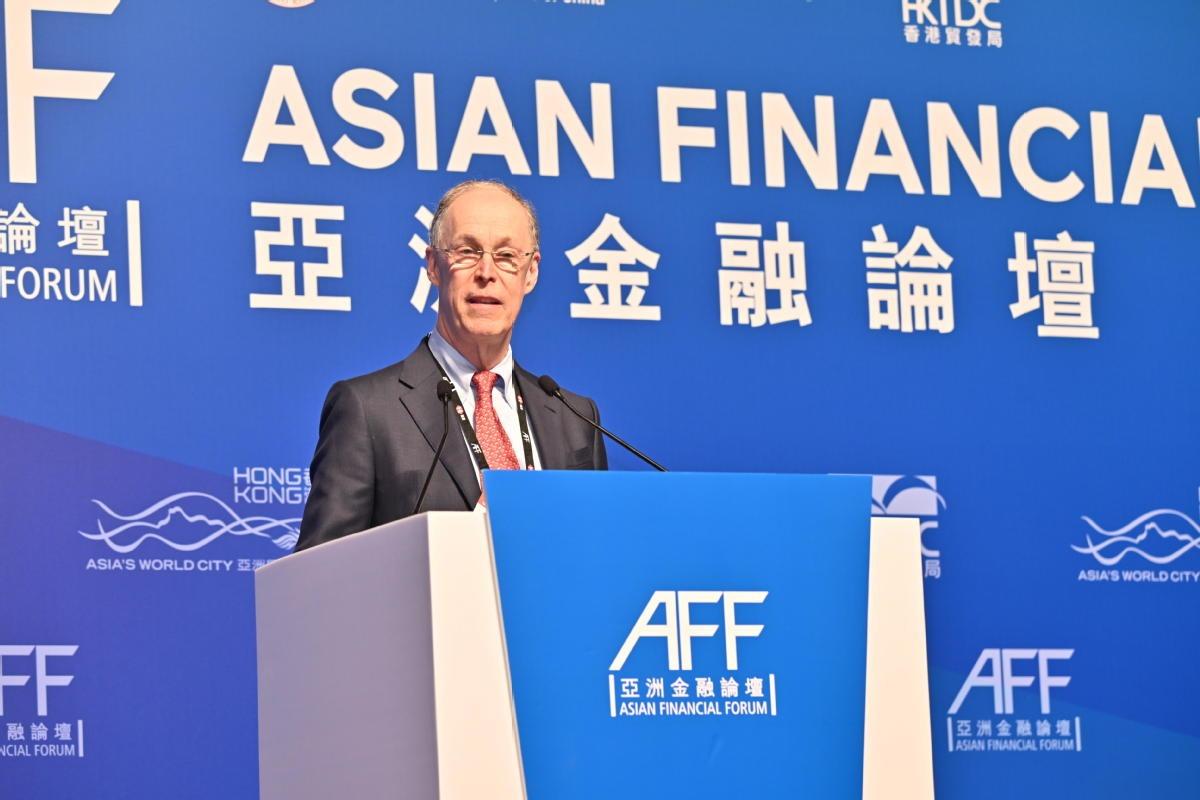 Nobel Laureate in Economic Sciences Douglas W. Diamond addresses the Keynote Luncheon on the second day of the 17th Asian Financial Forum 2024 in Hong Kong on Jan 25, 2024. (PHOTO / CHINA DAILY)
Nobel Laureate in Economic Sciences Douglas W. Diamond addresses the Keynote Luncheon on the second day of the 17th Asian Financial Forum 2024 in Hong Kong on Jan 25, 2024. (PHOTO / CHINA DAILY)
Global economies are not facing financial crisis any time soon, but the weak link of commercial property should draw scrutiny, said Nobel Laureate in Economic Sciences Douglas W. Diamond.
Many small and medium-sized banks in the United States hold property-related loan assets, which have become a major risk in recent years, Diamond said in his remarks at the Keynote Luncheon on the second day of the 17th Asian Financial Forum 2024 in Hong Kong on Jan 25.
He said it is difficult to judge the next crisis in the global banking industry, but commercial property has become a weak link in the industry, as remote work during the pandemic has reduced the demand for commercial space.
One positive thing is that Diamond does not think we are not going to have a major financial crisis, said the Merton H. Miller Distinguished Service Professor of Finance at the University of Chicago's Booth School of Business.
READ MORE: AFF to showcase HK’s strengths as world financial center
However, Diamond described geo-economic fragmentation as the global economy "splitting into different parts of the world with different groups and ending with less efficient trade and less efficient production all around the world".
Diamond said that if China "could bring the spirit that they had in Hong Kong's financial sector" to Shanghai and the rest of the country "then they could compete well with the rest of the world"
"I'm not a macroeconomist. I'm not a political scientist," said Diamond. "So, I'll try to talk from the perspective of a financial crisis expert to think about the role of geo-economic fragmentation and whether we're soon to see a change in the trend toward more and more fragmentation."
Thus multilateral collaboration among competing factions is vital in the current world.
He pointed out that the idea that free trade and economic integration is a self-reinforcing process also has a downside.
READ MORE: AFF: Financial leaders identify key strategies for new markets
"Unfortunately, the opposite of free trade and economic integration is also a self-fulfilling, self-reinforcing process," said Diamond, who won the Nobel Memorial Prize in Economic Sciences in 2022 for his ground-breaking research on banks and financial crises.
To try to reverse the trend of fragmentation seems difficult, he said, and it is going to require multilateral cooperation across the different factions in the world that are trying to protect themselves from each other.
Talking about US-China tensions, Diamond noted there are "some US policymakers that think that if there was a way to get more cooperation, that would be good for both countries".
However, Diamond said that there is a negative narrative in certain corners where people look at what happened when world trade increased and the share of imports into the US from China increased.
ALSO READ: AFF: Investment in Chinese mainland seen to rebound in '24
"There's a belief that some of that caused mass unemployment," he said, noting that this was not well documented empirically, and was not among the top reasons for the job losses.
During the AFF, Diamond told China Daily of the potential of China's finance sector. "Basically, they've had historically a very strong financial sector in Hong Kong," he said.
Diamond said that if China "could bring the spirit that they had in Hong Kong's financial sector" to Shanghai and the rest of the country "then they could compete well with the rest of the world".
The two-day forum was co-organized by the Hong Kong Special Administrative Region Government and the Hong Kong Trade Development Council. The Keynote Luncheon on Jan 25 was moderated by Raymund Chao, chairman of PwC Asia Pacific and China.


